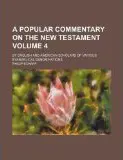

A Popular Commentary on the New Testament, vol. 4: The Catholic Epistles & Revelation
Pages
434
Published
3/6/2012
ISBN-13
9781130724356
This historic book may have numerous typos and missing text. Purchasers can download a free scanned copy of the original book (without typos) from the publisher. Not indexed. Not illustrated. 1883 Excerpt: ...to life and godliness,' and sedulous application on our side. But the object which is set before us is worth all the expenditure, both human and Divine. The dependence of knowledge upon holiness, or of vision upon purity, which is stated in the most absolute form in such passages as Matt. v. 8, Hcb. xii. 14, and in relation to practical obedience to God's will in John vii. 17, is presented here in connection specially with the need of completeness in the Christian character and fruitfulness in the Christian life. So, in Col. i. 10, Paul speaks of being 'fruitful in every good work, and increasing in the knowledge of God.' Ver. 9. For he who lacketh these things. This is one of two instances in which the A. V. strangely mistranslates the Greek causal particle 'for' as'but.' The other is I Pet. iv. 15. In Rom. v. 7 it erroneously renders the same causal particle by 'yet.' In the present case it has followed Wycliffe, Tyndale, and Cranmer, who all have 'but,' rather than the Genevan and Rhemish, which give 'for.' It thus entirely misconceives Peter's meaning, lie is not simply setting one thing over against another, but is adducing a second reason for the course which he recommends. The reasoning may be understood in more than one wav. it may be taken broadly thus--these graces are to be cultivated; for, if we have them not, we become blind, and 'sink back into a want of power to perceive even the elementary truths of the kingdom of God' (Plumptre). Or it may be put thus, in immediate relation to the nearest idea,--these graces are to be cultivated; for, wanting them, we want the capacity for this perfect ' knowledge of our Lord Jesus Christ.' A different expression also is given now to the idea of possession. Instead of saying, as before, 'he for whom these t...
Inner Books
This physical volume has several internal sections, each of which has been reviewed independently
- James by
- Hebrews by
- 1 Peter by
- 2 Peter/Jude by
- Johannine Epistles by
- Revelation by